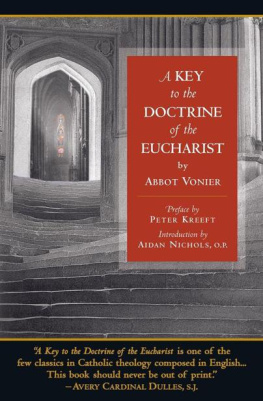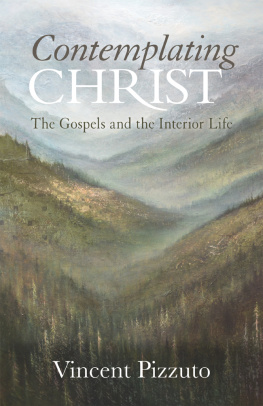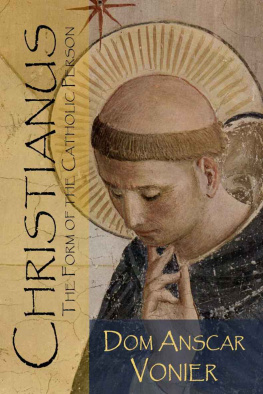THE PERSONALITY
OF CHRIST
BY
DOM ANSCAR VONIER, O.S.B.
ABBOT OF BUCKFAST
Assumption Press
2013
Nihil Obstat.
Francis. M. Canon Wyndham, Censor Deputatus.
I mprimatur.
Edm . Canon Surmont, Vic. Gen.
Westminster
August 26, 1914.
The Nihil Obstat and Imprimatur are official declarations that a book or pamphlet is free of doctrinal or moral error. No implication is contained therein that those who have granted the Nihil Obstat and the Imprimatur agree with the content, opinions or statements expressed.
This book was originally published in 1915 by Longmans, Green, and Co.
Copyright 2013 Assumption Press.
Cover image: Christos Pantocrator,
Saint Catherines Monastery, Mount Sinai, 6th Century
FOREWORD
The four Gospels are the books most written about and most commented on in our own days. No age has produced anything superior, in finished scholarship, to the Gospel literature of our times. Even those exegetes from whom the fullness of the Christian faith is not to be expected are mostly reverent and often exhibit learning of the highest quality. Indeed, the modern system of Meditation, on the other hand, as an integral part of spiritual and ascetical life, has produced an endless variety of books in which Christs Life is set forth in a way that ought to be most efficacious in making us understand the Gospels, as they are ransacked by the writers of Meditations in order to compel us to more intimate love for, and more close imitation of, Christ. Some of those productions are really superior studies of the wonderful character of Christ, and they give us what mere exegetical learning could never give an insight into Christs intimate Life. The present work is neither exegetical, nor apologetical, nor devotional, but strictly theological. Catholic Christology has received less attention from the public, though our own days have seen the production of some first-rate treatises de Verbo Incarnate by professional theologians. Yet we cannot entirely neglect the theological view of Christ without grave dangers to both our exegetical and devotional efforts. In my own humble way I am trying to help in filling up the great gap with the present modest book.
The English Fathers of the Dominican Order are bringing out an English translation of the third part of the Summa of St. Thomas Aquinas, which is his treatise on the Incarnation. That there should be a demand for such a work, in the Anglo-Saxon world, is a thing to rejoice the Angels ; there are evidently men amongst us eager to penetrate the subtleties and sound the depths of the masterpieces of religious thought.
My book is a very unconventional rendering of the most important points of the third part of the Summa ; but I trust that I have at least succeeded in giving the spirit of the great medieval saint and thinker, and if the following pages produce a desire in the reader to go to the Summa itself, I shall consider that I have had a notable success.
ANSCAR VONIER, O.S.B.
B uckfast Abbey.
May 1, 1914.
CHAPTER I
THE METAPHYSICS OF THE INCARNATION
T here is from the very beginning of our Lords earthly life the substitution of the personal element for the purely legal element. He is a mysterious personality, and the whole success of His religion lies in His being trusted, in His being followed, in His being understood; the main precept of His religion is a personal precept of love for one another. In other words, instead of material legal observances He established the great observances of the human heart, of mutual understanding, of mutual support, of mutual love. Bear ye one anothers burdens, and so you shall fulfill the law of Christ.
It is the triumph of His grace to keep human beings in the oneness of religious faith without imposing upon them any strict obligation of uniformity in external ascetical practice. He Himself, in His own Person, is the unifying force of Christianity. His first disciples followed Him in the simplicity of their new friendship, carried away by His ineffable charm. No doubt they gloried in being the followers of so great a rabbi, and yet they had no external observance to make them into a school. How could they be the followers of a teacher without fasting, whilst the disciples of John and the disciples of the Pharisees fast so frequently? In other words, how could any man be a disciple of another man unless he carried in himself the badge of that mans mastery in the way of a fast, or an ablution, or a prayer?
Men hold their fellow men together with the chains of some external austerity; no man can be another mans master in truth and reality without putting upon the neck of the disciple the iron yoke of bodily observance; yet it was to be the achievement of the new rabbi to have a school whose only observance it was to believe and to have confidence in Him, and to have friend ship and love one with another.
By this shall men know that you are my disciples, if you have love one for another.
Can the children of the marriage fast as long as the bridegroom is with them? But the days will come, when the bridegroom is taken away from them, and then they shall fast in those days.
Fasting has its part in the formation of a Christian. But you are not Christs disciple simply because you fast four times in the week, whilst Johns disciples fast thrice, and the Pharisees twice. By this shall men know that you are my disciples, if you have love one for another.
The early attraction to Christ and fidelity to Him have all the joyous liberty of a nuptial feast; attachment and fellowship are all the surer because the feast is bright and gay; serious work is to be done after the feast, but the memory of the feast remains the undying tie of attachment.
The peace and the prosperity of the Christian cause are all in that. All conversion, all sanctity, must be associated with Christs Person and the human persons with whom our lot is cast. Sanctity may indeed have certain secondary variations. With some souls Christs Person is the predominating element; with other souls, thoughts active thoughts are concerned more directly with the visible human persons; but persons it is, and Christian religion is in danger where legal observance of some sort begins to crowd out the personal element, when all spiritual efforts are directed towards the scrupulous carrying out of a system of observances for their own sake without a personal purpose.
The spirit of Christianity, despite its ascetic purity, is diametrically opposed to such a material conception of the ethical life, and the temporary successes it may obtain are but the harbingers of final catastrophe. It is our Lords exclusive privilege to be Law, or better still to be a substitution for all law. The human mind is jealous of such a position because the human mind resents being bound to a person; but as our Lords Person is a Divine Person, as it is the second Person of the Trinity, the jealousy of the human mind is not warranted in the case of Christ.
The Pharisees took umbrage at our Lords Person much more than at His doctrine. Abstract laws or external observances never arouse hatred and jealousy, just as they do not arouse love and sympathy in the measure in which a person arouses those feelings.
The great theological doctrines therefore concerning our Lords Person have an intimate connection with our Lords spiritual position in the world, because our Lord is nothing if not a Personality. His Grace is nothing if not a grace of love and of mutual understanding. There is no profit from the Gospel unless it be the perfecting of the human mind and the human heart. A man may invent an ascetical system and find other men to submit to it, but no man can make of his own person the irrevocable voice of conscience, the all-satisfying food of heart and mind. Our Lord is the only Person who ever could.




